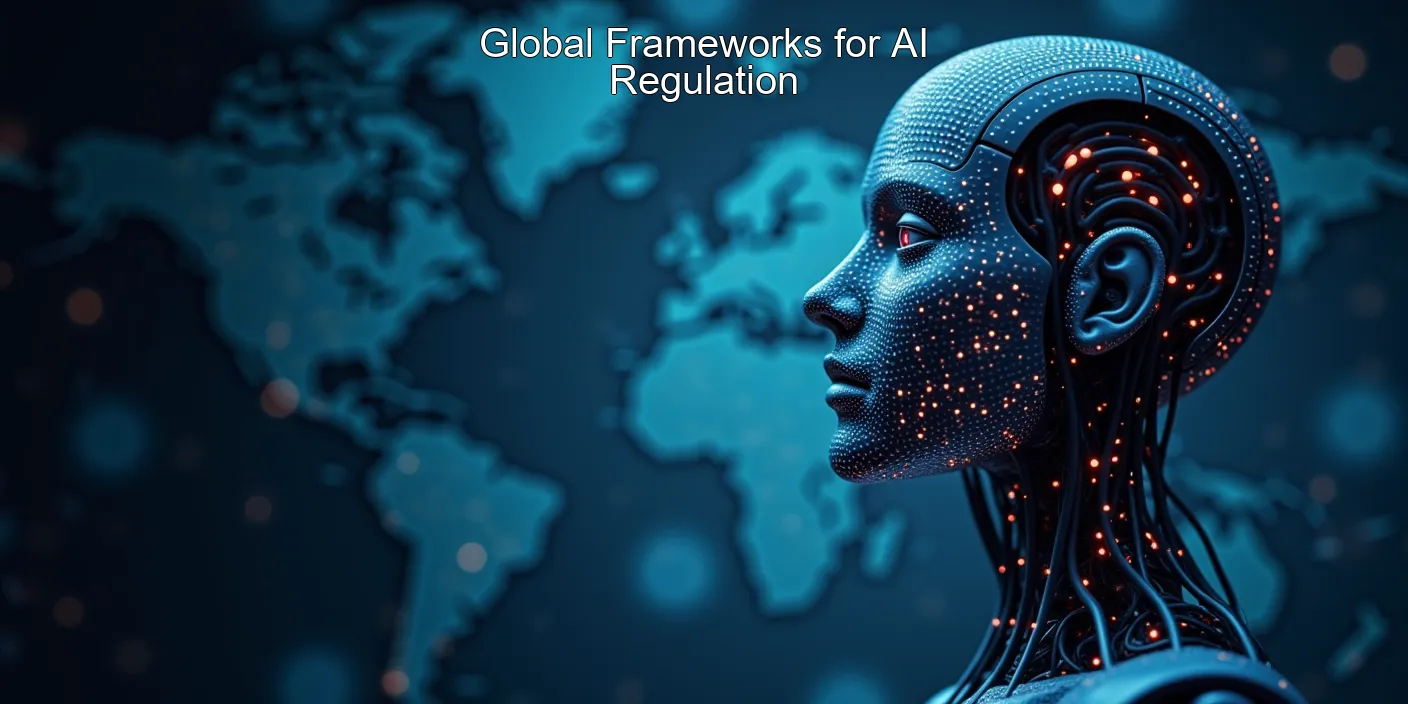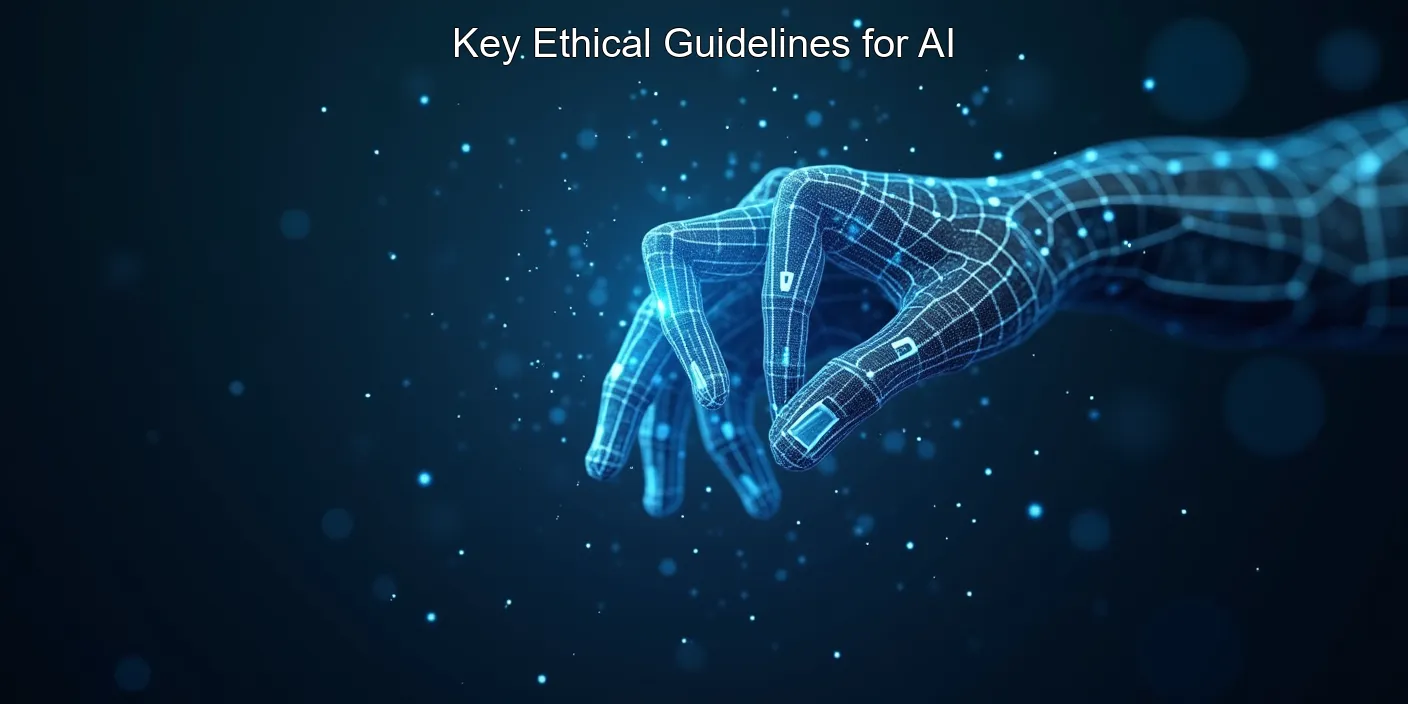Ethical AI Regulation: Guidelines and Frameworks for Responsible Development
| Principle | Description |
|---|---|
| Transparency | AI systems should be explainable and auditable |
| Accountability | Clear responsibility for AI decisions and outcomes |
| Fairness | AI should not discriminate or perpetuate biases |
| Privacy | Protection of personal data used in AI systems |
As artificial intelligence becomes more prevalent in our daily lives, establishing ethical guidelines for its development and use is crucial. Let’s explore the key principles and frameworks shaping AI regulation.

“AI in Daily Life: Ethics and Regulation Principles”
#AIRegulation, #EthicalGuidelines, #TechPolicy
- Transparency in AI algorithms and decision-making processes
- Accountability measures for AI developers and deployers
- Fairness and non-discrimination in AI outcomes
- Privacy protections for data used in AI systems
“The future of AI will be about minimizing risks while maximizing benefits.” – Satya Nadella, CEO of Microsoft
Frequently Asked Questions
Q: Why is AI regulation necessary?
A: AI regulation ensures responsible development and protects individuals from potential harm or discrimination caused by AI systems.
Q: Who is responsible for creating AI regulations?
A: Governments, international organizations, and industry leaders collaborate to develop AI regulations and guidelines.
Q: How can companies ensure compliance with AI regulations?
A: Companies can implement ethical AI frameworks, conduct regular audits, and prioritize transparency in their AI development processes.
Best Practices for Ethical AI Development
- Conduct thorough impact assessments before deploying AI systems
- Implement diverse and inclusive AI development teams
- Regularly test AI systems for biases and unintended consequences
- Provide clear explanations of AI decision-making processes
- Establish mechanisms for human oversight and intervention
According to a 2021 survey by Deloitte, 73% of AI professionals believe that AI regulations will have a positive impact on their industry. This statistic underscores the growing recognition of the importance of ethical AI guidelines.
Global Frameworks for AI Regulation

| Framework | Organization | Key Focus |
|---|---|---|
| AI Ethics Guidelines | European Commission | Trustworthy AI |
| OECD AI Principles | OECD | Inclusive growth and well-being |
| Beijing AI Principles | Beijing Academy of AI | Research, development, and governance |
Several global organizations have developed frameworks to guide the ethical development and deployment of AI technologies. These frameworks provide a foundation for creating comprehensive AI regulations.
“Global AI Ethics Frameworks: Guiding Principles for Regulation”
- European Commission’s AI Ethics Guidelines focus on human-centric AI
- OECD AI Principles emphasize inclusive and sustainable growth
- Beijing AI Principles address research, development, and governance
- IEEE Global Initiative on Ethics of Autonomous and Intelligent Systems
“AI is one of the most important things humanity is working on. It’s more profound than electricity or fire.” – Sundar Pichai, CEO of Google
Q: Are AI regulations the same across all countries?
A: No, AI regulations vary by country, but there are efforts to create global standards and principles.
Q: How do AI regulations impact innovation?
A: While some argue regulations may slow innovation, many believe they foster trust and responsible development, ultimately benefiting the industry.
Q: What role do tech companies play in AI regulation?
A: Tech companies often participate in developing guidelines and are expected to implement ethical AI practices in their products and services.
Steps to Implement Ethical AI Practices
- Establish an AI ethics committee within your organization
- Develop clear guidelines for AI development and deployment
- Provide ongoing training on ethical AI practices for all employees
- Collaborate with industry peers and regulators to share best practices
- Regularly assess and update AI systems to ensure compliance with evolving regulations
A 2022 report by Gartner predicts that by 2025, 30% of large organizations will have an AI ethics board to guide their AI strategies. This trend highlights the growing importance of ethical considerations in AI development.
As we continue to explore the potential of AI Innovations, it’s crucial to consider the ethical implications and ensure responsible development. By implementing robust regulatory frameworks and ethical guidelines, we can harness the power of AI while minimizing risks and promoting trust in these transformative technologies.
The intersection of AI in Everyday Life and ethical considerations will shape the future of technology. As AI becomes more integrated into our daily routines, from AI in Entertainment to healthcare and beyond, the need for comprehensive Ethical AI guidelines becomes increasingly apparent.
The Importance of AI Regulation
| Key Aspect | Importance |
|---|---|
| Ethical Use | Ensures AI benefits society |
| Safety | Prevents potential harm |
| Accountability | Establishes responsibility |
As artificial intelligence continues to reshape our world, the need for robust ethical guidelines and regulatory frameworks becomes increasingly crucial. These regulations serve as guardrails, ensuring that AI technologies are developed and deployed responsibly, with the best interests of humanity in mind.
- Protect individual privacy and data rights
- Prevent discrimination and bias in AI systems
- Ensure transparency and explainability of AI decisions
- Promote fairness and equity in AI applications
“The development of full artificial intelligence could spell the end of the human race… It would take off on its own, and re-design itself at an ever-increasing rate.” – Stephen Hawking
Q: Why is AI regulation necessary?
A: AI regulation is essential to ensure ethical use, prevent potential harm, and establish accountability in AI development and deployment.
Q: Who is responsible for creating AI regulations?
A: Governments, international organizations, and industry leaders collaborate to develop AI regulations and ethical guidelines.
Q: How can we balance innovation with regulation?
A: Effective regulation should promote responsible innovation while safeguarding against potential risks and ethical concerns.
Key Ethical Guidelines for AI

| Guideline | Description |
|---|---|
| Transparency | AI systems should be explainable and understandable |
| Fairness | AI should not discriminate or perpetuate biases |
| Privacy | AI must respect and protect personal data |
Ethical guidelines form the backbone of responsible AI development. These principles ensure that AI technologies align with human values and societal norms. Let’s explore some key ethical considerations that shape AI regulation.
- Respect for human autonomy and dignity
- Promotion of human well-being and flourishing
- Fairness and non-discrimination in AI decision-making
- Transparency and explainability of AI systems
- Privacy protection and data governance
“AI is one of the most important things humanity is working on. It is more profound than electricity or fire.” – Sundar Pichai, CEO of Google
Q: How can we ensure AI systems are transparent?
A: Developers should prioritize explainable AI techniques and provide clear documentation on how AI systems make decisions.
Q: What measures can prevent bias in AI?
A: Regular audits, diverse development teams, and careful data selection can help mitigate bias in AI systems.
Q: How do ethical guidelines impact AI innovation?
A: Ethical guidelines encourage responsible innovation by setting standards for AI development that align with societal values.
Implementing AI Regulatory Frameworks
| Framework Component | Purpose |
|---|---|
| Legislation | Establish legal boundaries |
| Industry Standards | Promote best practices |
| Oversight Bodies | Monitor compliance |
Implementing effective AI regulatory frameworks requires a multi-faceted approach. Governments, industry leaders, and academic institutions must collaborate to create comprehensive guidelines that address the complex challenges posed by AI technologies.
- Develop clear legislation and policies
- Establish industry-wide standards and best practices
- Create independent oversight bodies
- Promote international cooperation on AI governance
According to a recent study by the World Economic Forum, 85% of business executives believe that AI will significantly change the way they do business in the next five years. This underscores the urgency of implementing robust regulatory frameworks to guide this transformation.
As we navigate the exciting yet challenging landscape of AI, it’s crucial to prioritize Ethical AI development. By establishing clear guidelines and frameworks, we can harness the power of AI to drive innovation in various sectors, including AI in Entertainment and AI in Everyday Life, while ensuring that these technologies benefit humanity as a whole.
The future of AI regulation will likely involve a dynamic interplay between technological AI Innovations and evolving ethical standards. By staying informed and engaged in these discussions, we can all play a role in shaping a responsible and beneficial AI-powered future.
| Key Aspects | Importance |
|---|---|
| Ethical Considerations | High |
| Public Safety | Critical |
| Fairness and Bias | Essential |
As artificial intelligence continues to evolve at a rapid pace, the need for comprehensive regulation becomes increasingly crucial. Here are the key reasons why AI regulation matters:
- Protecting individual privacy and data rights
- Ensuring fairness and preventing algorithmic bias
- Safeguarding against potential misuse or malicious applications
- Promoting transparency and accountability in AI systems
“The development of full artificial intelligence could spell the end of the human race.” – Stephen Hawking
FAQ on AI Regulation
Q: Why is AI regulation necessary?
A: AI regulation is necessary to ensure the responsible development and deployment of AI technologies, protecting society from potential risks and ethical concerns.
Q: Who is responsible for creating AI regulations?
A: Governments, international organizations, and industry leaders collaborate to develop AI regulations and ethical guidelines.
Q: How can AI regulation keep up with rapid technological advancements?
A: AI regulation must be flexible and adaptable, with regular reviews and updates to address emerging challenges and technologies.
Steps for Effective AI Regulation
- Establish clear ethical guidelines and principles
- Develop comprehensive legal frameworks
- Implement robust testing and auditing processes
- Foster collaboration between stakeholders
- Promote public awareness and education
According to a recent study by the World Economic Forum, 85% of business leaders believe AI will significantly change their industries by 2025, highlighting the urgency of establishing effective regulations.
Ethical Frameworks for AI Development

| Framework | Focus Area |
|---|---|
| IEEE Global Initiative | Ethically Aligned Design |
| EU AI Act | Risk-based Approach |
| OECD AI Principles | Responsible AI Stewardship |
Ethical frameworks serve as guiding principles for the development and deployment of AI systems. These frameworks aim to ensure that AI technologies are designed and used in ways that benefit humanity while minimizing potential harm.
“Guiding AI: Ethical Frameworks for Human Benefit and Safety”
- Transparency and explainability in AI decision-making
- Fairness and non-discrimination in AI algorithms
- Privacy protection and data governance
- Accountability and liability for AI actions
“AI systems must be designed to align with the overarching aim of promoting human well-being.” – EU High-Level Expert Group on AI
FAQ on AI Ethics
Q: What are the main ethical concerns in AI development?
A: The main ethical concerns include bias, privacy, transparency, and the potential for AI to replace human jobs.
Q: How can companies ensure their AI systems are ethical?
A: Companies can implement ethical review boards, conduct regular audits, and prioritize diversity in AI development teams.
Q: What role do consumers play in promoting ethical AI?
A: Consumers can demand transparency from companies using AI and support those that prioritize ethical AI practices.
- Conduct thorough impact assessments
- Implement diverse and inclusive development teams
- Establish clear guidelines for data usage and privacy
- Regularly test for bias and fairness
- Provide clear explanations of AI decision-making processes
A survey by Deloitte found that 32% of companies are investing in AI technologies that can help explain how their AI systems make decisions, demonstrating a growing commitment to ethical AI practices.
As we navigate the complex landscape of AI regulation and ethics, it’s crucial to strike a balance between innovation and responsible development. By implementing robust Ethical AI frameworks and fostering collaboration between stakeholders, we can harness the potential of AI while safeguarding society’s interests. The future of AI Innovations depends on our ability to create and enforce ethical guidelines that promote trust, fairness, and transparency in AI systems.

While regulation is essential, it’s equally important to recognize the positive impact of AI in Everyday Life. From improving healthcare diagnostics to enhancing educational experiences, AI has the potential to revolutionize various aspects of our lives. As we continue to explore the possibilities of AI in Entertainment and beyond, let’s remain committed to developing AI technologies that align with our ethical values and contribute to the betterment of society as a whole.



